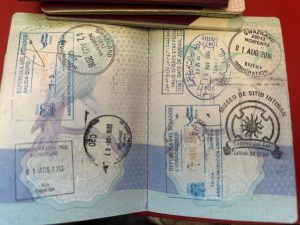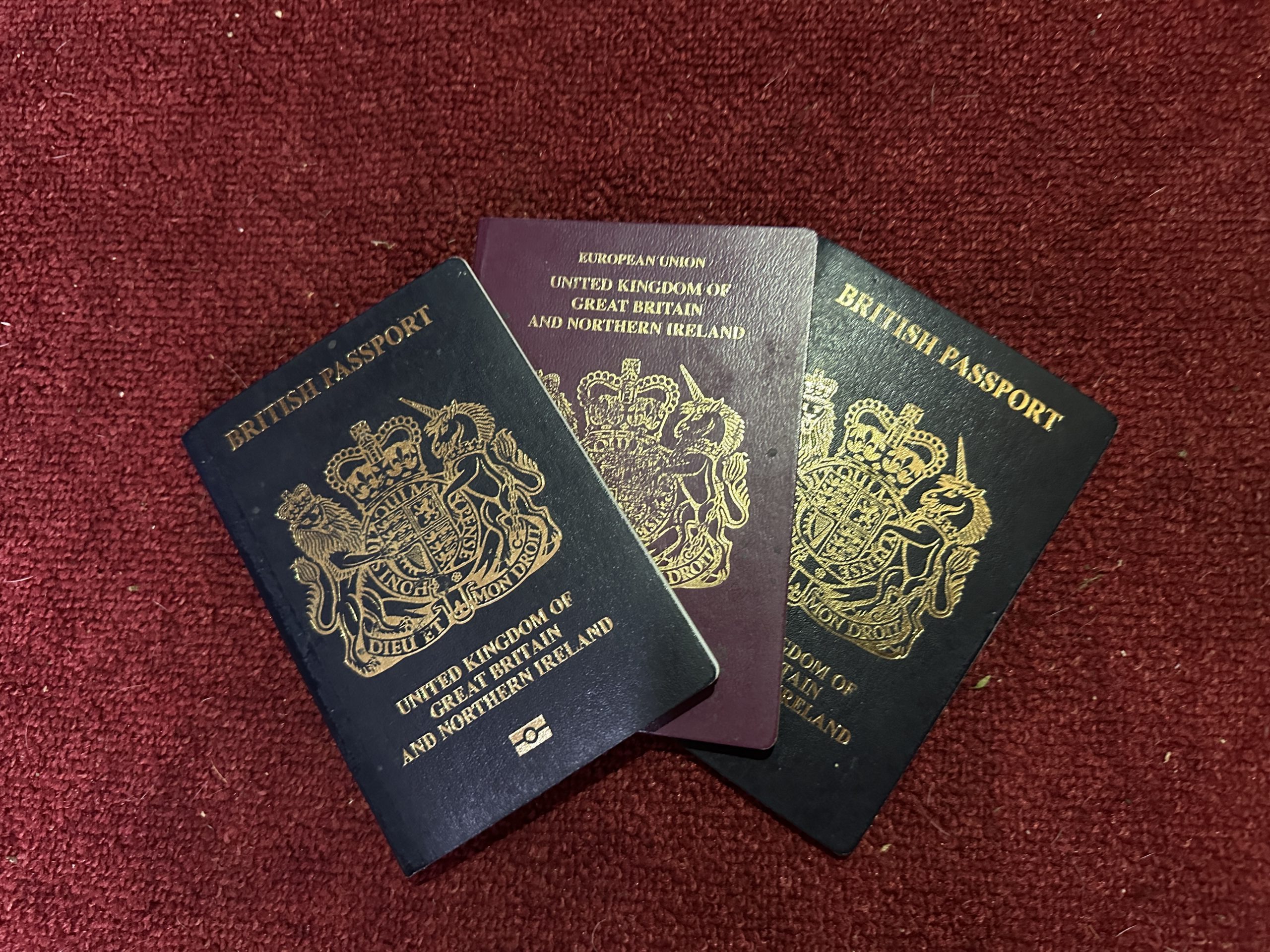Since this blog site is called Passport at the Ready, I really should ensure your passport is ready. Usually, the only thought most people give to a passport is remembering to bring it with them. Maybe you also check if it is in date. However, one of our holidays was nearly completely ruined due to a problem with a passport we hadn’t noticed for six years. I will explain more later.
1. New passport not arriving on time

There are reports of passport delays every year. In 2022, the problem was especially bad, as more people than normal had let their passports expire due to COVID-19, and in the UK, the HM Passport Office couldn’t send the passports back quickly enough. Since then, things have improved.
So, what should you do when you need a new passport? The UK Passport Office says you should allow 10 weeks to get your passport renewed. However, if you need your passport any time from Easter to the end of the school summer holidays, you might want to allow more time, as the first half of the year is very busy. In the UK, you are no longer given credit for any months left on your old passport, but renewing it earlier will give you peace of mind.
If you need to renew your passport urgently, you could pay for an online premium service or a 1-week fast track service. You will need to get an appointment, and during busy times, these appointments can be like gold dust and are all fully booked.
If you have already sent your passport in, you can’t request an urgent service subsequently.
If you need a passport urgently for a medical problem or need to travel because a family member abroad is seriously ill or died, then you can contact the passport office for help.
When I contacted them about a problem, they were very understanding and helpful; they even told me about a small alleyway we could use from the station to get there before it closed. However, they can’t hunt through their backlog of passports waiting to be dealt with, even if your holiday is imminent.
Most passports are delayed because of a problem or query with the application, so fill it in very carefully. If you want, the Post Office will check a paper passport application for a fee of £16.
2. It’s out of date

Check your passport expiry dates, especially your children’s passports, as they only last 5 years compared to 10 years for adults.
If you are going on holiday in the Schengen Area (most of Europe), check if it has been more than 10 years since the passport was issued. In 2018, they stopped adding extra months to your new passport if you applied for a passport early. However, if you have an older passport, although it might say it is still in date, your passport won’t be accepted in the Schengen Area if it was issued more than 10 years ago.
3. Not enough time
So, your passport is in date until after you come back, that will be fine, won’t it? No. Many countries require you to have 6 months left on your passport after your return home; for most of Europe, it is 3 months. You can check the requirements for your trip on your government’s travel advice website.
4. Not enough pages

You can pay for a passport with 54 pages, compared to the standard UK passport with 34 pages, or you can get a second one. Second passports are very useful for those who travel a lot for business. You can send one passport to get a visa and still travel using your second passport. Unfortunately, they are issued mainly for professional reasons, not for vacations.
5. It is damaged
If your passport is damaged in any way, it becomes invalid, which can be especially difficult if you are on holiday when it happens. Passport controls are always looking for forged passports, and a damaged passport might hide evidence of forgery. If you drop your passport in the hotel pool, you must get an emergency travel document. If you have a coffee cup stain inside the passport, you might get away with it, provided it is nowhere near the photo or any information. However, they still have the right to reject it, and some people find their passports rejected for minor damage they didn’t even notice.
Reasonable wear and tear is acceptable, but discolouration or missing pages means your passport won’t be accepted.
To get an emergency travel document, contact your local embassy. You might be able to complete most of the information they need online before your appointment, which makes things much quicker.
6. Lost or stolen
If you lose your passport or it is stolen, you must apply for another passport or, if you are on holiday, contact the embassy for an emergency document.
If your passport was stolen, report it to the police and obtain a case number. Then, if you are lucky enough to have the right insurance, you might be able to claim back some of the costs for an emergency document.
7. Details incorrect
When you get your new passport, ensure all the details are correct.
When you check-in, you need to give the airline your passport number. If you have used the airline before, they might have your old passport number. Ensure they have your new passport number, which won’t be the same as your old one.
Check the name is correct. Your ticket and passport name must be the same; this can be an issue for newlyweds who have changed their names. My husband goes by the name Dave or David, and he seems to choose which name he selects randomly. This has caused problems when booking hotels, but it is an expensive mistake when booking airline tickets. Make sure on the passport they have spelt your name correctly and given you the correct date of birth.
Check your nationality and citizenship. We didn’t, and that was what I was referring to at the beginning of the blog. My husband had been using his passport for 6 years; we had even gone to Australia with it and had no problems, but when we handed our bags in the night before we were due to travel to the USA, it was pointed out that his passport said he was a British Subject, not a British Citizen, and therefore had different immigrant requirements and the ESTA he had filled in would not be accepted.
Six years previously, when he got his new passport, they had put the wrong citizenship status, and we had never noticed. I didn’t even know what the different terms meant. My husband had to dash home to get all the documents he could find to prove he was a British Citizen, including his old passport and catch a train to London. Late in the night, he phoned to say he had a new passport, and he didn’t have to pay as it was a clerical error.
Unfortunately, I had to repack our bags, so he had his own bag in case I had to go ahead with our four children. In the chaos, I left my driver’s licence at home, which is a bit of a problem when you are going on an RV touring holiday and you are the only driver.
8. It has a souvenir stamp

Many places have stamps to show that you visited a place, such as the North Pole. These aren’t official stamps, even though you can get the North Pole stamp at a post office in Finland. These stamps are fun and cool to collect but shouldn’t be in your passport.
There is a lot of confusion over souvenir stamps; some countries consider them damage to the passport as only authorised officials may place stamps or make notations, and other countries aren’t that bothered.
People have been refused boarding because they have souvenir stamps. One young girl was denied boarding because her passport had a Hello Kitty stamp, and a UK woman was refused boarding because her passport had a Machu Picchu stamp. Although the UK government has a relaxed attitude to these stamps, she was flying from Spain, and they considered the passport invalid.
Rather than putting the stamps in your passport, you can always buy a Souvenir Passport Stamp Book, which they sell on Amazon. It is a lot cheaper than getting a new passport.
9. It has an undesirable country’s stamp
Some countries don’t want you to visit them if you have been to countries they don’t get on with. Israel stamps used to be a problem, but they have now stopped stamping passports.
If you have been to Cuba since January 2021, you won’t be able to get the normal ESTA when going to the USA; instead, you need a B2 Visa, which requires an interview; the same applies if you have visited Iran, North Korea, or Syria.
The good news is that Cuba doesn’t usually stamp passports anymore, nor does Iran or North Korea. Don’t, however, ask for a stamp in your passport, as it might restrict future travel.
Gradually, more countries are no longer stamping passports as technology makes it unnecessary.
Summary
Hopefully, your passport won’t cause you problems, and once you have checked the above, your Passport will be Ready.

Leave a Reply